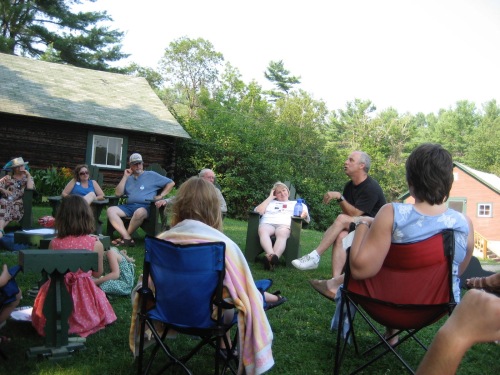 One story leads to another. The story that is told begs for one in response. This requested response (even if the teller isn’t aware of it) is a law of storytelling – a natural law – woven into the fabric of the universe. A story is not complete until another story is told in response. Jorge Luis Borges’s observation that a poem is not an argument but a suggestion holds true for story, too. A story is an invitation to remember, and once remembered, what is remembered is offered up also.
One story leads to another. The story that is told begs for one in response. This requested response (even if the teller isn’t aware of it) is a law of storytelling – a natural law – woven into the fabric of the universe. A story is not complete until another story is told in response. Jorge Luis Borges’s observation that a poem is not an argument but a suggestion holds true for story, too. A story is an invitation to remember, and once remembered, what is remembered is offered up also.
Storytelling is not about one story, but two (or three, or four) – it is about reciprocity – the story returned with another story from another voice.
Sometimes, as Lewis Hyde says in The Gift, the story, or the gift, goes around the corner. The teller may lose sight of it, but the process is started, and continues, until it comes back to the teller from another direction. After a play, we sit with friends and talk about what the play said, what it reminds us of, about something in our lives. The story told leads to another story that is heard.
The notion of reciprocity occurs to me as I listen to the noise of the news and the media, the onslaught of words and images we’re faced with daily when we turn on the radio, or the television, or look at the Facebook page or Twitter feed or newspaper. A million stories being thrown at us. And we end up feeling overwhelmed.
Why is that?
One reason for the sinking feeling we have, the sense of drowning in a digital and informational tsunami, is that none of the sources listen back. They’re all insistent that they have something important to say, or riveting, or compelling – news that you “need”, “must see tv”, things you “need to know”. This insistence, this begging for attention, is relentless and once given, the insistence that we KEEP listening is not based on the return of story, but the platform’s need to keep us hooked.
“We want to know what you think.”
Really? Has anyone at Facebook ever called you or written and said, “I’m so glad to hear you feel that way”, or “I’ve never thought about what you said”? What we know, and have accepted, is that the media platforms want you to respond because you’re providing content for them so that others will keep watching and listening. In our response to Facebook posts, or reviewing books on Amazon, or retweeting, we’re giving their platform more material. A great giant maw that must be fed.
Our friends, or acquaintances, or passers-by, or trolls respond. We post things, hoping someone will listen, but we have no guarantees, and the gratification we get – the likes, or emojis, or even one hundred and forty character responses, are temporary rushes of seratonin, or adrenaline, or something, that keep us plugged in, looking for more. Our phone bings and Pavlov’s dogs are satisfied, briefly.
Compare this search for meaning and rush of feeling and brain chemicals to a talk we have with someone in which a story or problem is shared, someone listens, and says, “Tell more more about that”, or “That reminds me of something that happened to me.” I argue (or, better, suggest) that those two experiences are significantly different – not just quantitatively, but qualitatively different. Engaged in a live interaction with another sentient being (ever had a conversation with a crow?), we are part of something bigger than ourselves – something that feeds us, and which we feed in return. Again, I call on us to trust our feelings in this – how do you feel after an hour sharing conversation with a friend. How do you feel after you spend an hour on Facebook, or reading Huffington Post?
I’m very aware of this need for reciprocity as a performing storyteller. The law of reciprocity is a blessing and a curse to a performer. While we have become used to performers being separate from audiences – they leave the stage, go the green room, put on their civilian clothes and walk free in the night – those who venture out into the lobby or street corner after a show experience something different. People stand in line – often to say they loved the show, but most often to tell a story – relate something that the storyteller brought to mind, or how the story or song has affected their lives. I can usually tell how good my show has been by how many people want to tell me a story afterwards.
That sharing, of course, can be exhausting. When storytellers give part of themselves, they feel exposed and vulnerable, and while some people have incredible stories to share, others are more like vultures picking over the bones, and talking to hear their own voices. People can say stupid things to us. Some people are so desperate to be heard, they have no sense of the boundary between people, they share too much, or put a burden on the performer that the performer has no responsibility to bear. I try to remember the subtext of those long boring stories: “I want someone to listen to me.”
We all want to be heard. And being heard is different from speaking. Or writing a post, or a tweet. Being heard happens in real-time, and has to do with reciprocity – a circle being completed.
Someone I met somewhere (was it you?) told me there are two kinds of listening: listening to respond and listening to understand. In listening to respond, we get an idea from what someone is saying and can’t wait to say our piece. When we’ve found what our little piece of information or wisdom, or need is, we no longer are listening – we’re waiting, trying to figure out how to not be rude, but get on with our story. But we all know the other kind of listening, listening to understand, is the kind of listening that calms the speaker, that makes him or her feel that someone has heard them and that their presence in the world matters.
I am not the most patient of people. I am subconsciously finishing every sentence that someone starts, wishing they would get to the point. And sometimes, when I’m tired, or preoccupied, I don’t even care about the point. But those times when I do listen after a performance – really listen – I know I’m easing the world’s soul, giving the speaker a gift, and also, deepening the connection I have with my own story, the story I told that set off this return. With the story given back to me, my own story now has more resonance, is more referential to the rest of the world, its roots dug in deeper to the sense of what it is to be human and alive. Further, the story I hear may end up becoming part of my story when I tell it again – if not in words, at least in feeling, in a sense that my work has a meaning beyond any I could give. Honestly, storytellers moan about this with each other – how they have to listen to someone talk ad nauseum about their uncle who had a foot operation because of his gout.
We should know better.
We should know that with our story told, only half of the work is done. I have come to realize that the story told in response is a necessary and essential part of the story experience. A story is not a single thing, an exhalation: it is a cycle – a breathing in and out – and the cycle, the whole story, the full expression, is not complete until a story is told in return. Story is what makes us human, and the notion of reciprocity, the story returned, is as much a part of it as exhaling is followed by inhaling. Breath is in and out, and so is story.
What I now know is that my job in telling a story is to help the listeners be reminded of their own. My job is to touch something in a person’s life so that there is a resonance. Story is about resonance – a re-sounding of a note – within someone else’s life. It’s about being connected to other living beings and taking the time to listen to that connection.











